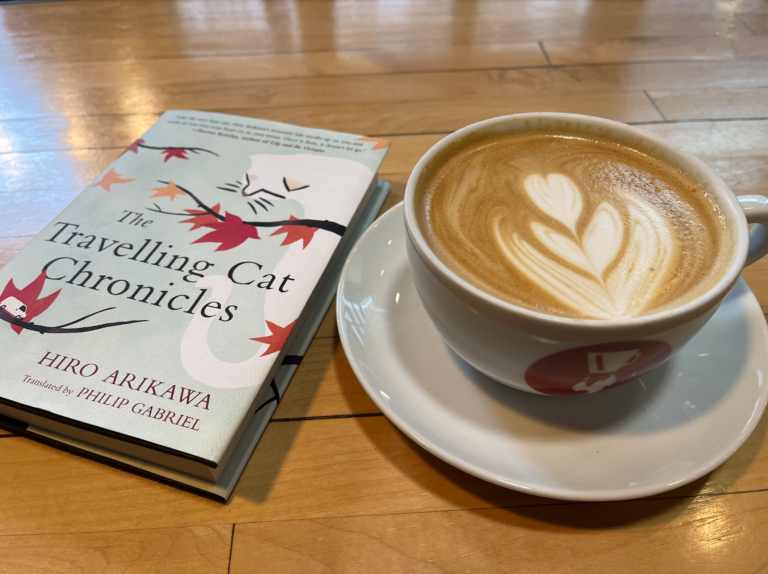This post contains affiliate links. For more info see our disclaimer.
Subscribe to the Under the Live Oak Newsletter Here
Note: In this review I explore the overarching themes of the book as opposed to plot and story to avoid any spoilers.
The Travelling Cat Chronicles is a novel by Japanese author Hiro Arikawa, translated by Philip Gabriel. This book has long been on my list, but when I received it as a Christmas gift from my lovely wife, I didn’t really know what to expect. I mean I read the back of the book jacket in the store and took a picture to put on my Good Reads account. That’s how most books end up on my list.
What was it really about though? Was it a travelogue in the traditional sense, where there may be some semblance of a plot but really the main character is the setting? Was it a cheery book about cats and all that makes us love them?
In this case, as with a lot of Japanese literature, more substantial themes are played out through the characters, and while the book visits various places in Japan, there are less specifics on the travel aspect. Even place names are avoided except for a few of the larger towns. Instead, the book focuses more on cultural aspects and in particular the relationships we keep throughout our lives.
The real distinction on what makes this book unique in my opinion is the use of the cat to provide an alternative perspective on some of the more intricate themes in life, or at least those that we tend to make more complicated than they may need to be.
This book not only takes you on a journey through Japan, but on an expedition through the entire range of emotions from euphoric joy to profound sadness and everything in between, alternating through the eyes of both the human and feline characters the story follows.
As I was reading, a couple of things stood out about our own culture in America as well as my own approach to some of these issues that we all deal with.
First off, Japanese culture I feel is more apt to embrace the entirety of life, both the good and the bad. In fact, one of my favorite Japanese concepts is “mono no aware” which recognizes that everything is temporary and that we need to celebrate and enjoy things while we have them, even if we know we won’t have them for long.
Here in America, we spend a lot of time trying to make our lives what we feel to be the perfect version of ourselves, and our constant conquest for happiness often gets in the way of the very thing we are trying to achieve. By focusing so much on the negatives to try to expunge them completely from our lives, we actually create an environment that constantly is telling us that we aren’t what we want to be which can result in a self-deprecating feedback loop.
Japanese culture tends to embrace these moments of sadness and imperfection, and dive deeper into those emotions, at least internally, even if they try their best to hide those emotions outwardly. I think the key to why this may be more beneficial to our psyche is twofold. It allows us to normalize the fact that we aren’t perfect or happy all the time and by surveying the full breadth of these emotions, the contrast between them becomes more noticeable, making our happiness more profound.
Another theme of the book is the complexity of human thought. Many times over in our heads we add layers upon layers to what we think someone thinks about us or we try to cat and mouse (no pun intended) our relationships, taking part in a never ending game of mind chess with an opponent that is often not even playing at all. What we create in our own heads often stretches far beyond reality and if we would stop for a minute and actually communicate, we would likely find this out.
Arikawa’s use of the cat to point out that things from an outside perspective are often not what they seem is both creative and genius. I mean, how often do those of us that are cat people say, “I wish I was a cat” and follow it up with some anecdote about sleeping and eating all day. Our own intellect is telling us that we want life to be more simple but instead we continue to constantly get in our own way.
After reading “The Travelling Cat Chronicles” I think my takeaway theme is to spend more time being present in the everyday. We are constantly looking for that Zen that exists somewhere in the future, whether it is retirement, travelling, or some other thing that takes us away from what we feel is our mundane reality. The truth is however, that if we do that, we are living almost the entirety of our lives trying to leave what is our inherent actuality, and in fact missing many of the elementary things along the way that can actually bring us true fulfillment.
Related Post: Stanley Tucci’s “Taste” is Both Flavorful and Familiar
Subscribe to the Under the Live Oak Newsletter Here

